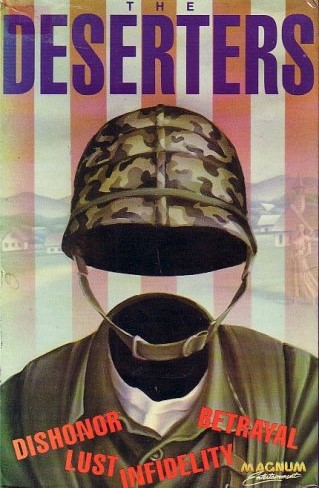 If you’re willing to put up with an abundance of low budget distraction you’ll find this to be one of the most interesting Canadian films of the 1980s. DESERTERS was the standout feature of the Vancouver based painter and indie film impresario Jack Darcus, and a high point in the career of actor Alan Scarfe. Hailing from 1983 (although it’s been claimed the film was actually shot several years earlier), DESERTERS was unique in Darcus’ oeuvre in that it received a home video release in the US (something none of his six other features, which include the trash movie pastiche OVERNIGHT and the Christopher Plummer starrer KINGSGATE, managed) via Magnum Entertainment.
If you’re willing to put up with an abundance of low budget distraction you’ll find this to be one of the most interesting Canadian films of the 1980s. DESERTERS was the standout feature of the Vancouver based painter and indie film impresario Jack Darcus, and a high point in the career of actor Alan Scarfe. Hailing from 1983 (although it’s been claimed the film was actually shot several years earlier), DESERTERS was unique in Darcus’ oeuvre in that it received a home video release in the US (something none of his six other features, which include the trash movie pastiche OVERNIGHT and the Christopher Plummer starrer KINGSGATE, managed) via Magnum Entertainment.
The film begins in the late 1960s, on a train where Ulysses Hawley (Scarfe), a decorated sergeant, meets up with one Captain Palmer (DR. FRANKENSTEIN ON CAMPUS‘ Ty Haller) and a pair of soldiers (Bob Metaclfe and Robin Mossley). Hawley doesn’t exactly ingratiate himself, regaling the trio with a morbid “joke” involving mass casualties in Vietnam (an account that turns out to have a much deeper significance than it initially seems to possess). His demeanor isn’t at all improved when Palmer informs him the two soldiers have dashed off into Canada, leaving Hawley alone in a Washington train station.
Obsessed with tracking down the soldiers, Hawley poses as a deserter himself, and enters the Vancouver home of the rabidly anti-war Canadian immigration officer Noel (Noel Burton) and his wife Val (Barbara March, a.k.a. Mrs. Alan Scarfe). There Hawley joins Peter (Jon Bryden), an American draft dodger who’s being sheltered by Noel.
Over the course of the following night convictions are tested and buried secrets unearthed. The wimpy Peter allows his orientation to change due to badgering by Hawley, who in turn reveals a far more soulful side. Val, meanwhile, admits to having amorous designs on Peter, and that she’s had her way with previous American military deserters taken in by Noel—who, it seems, knows about his wife’s extramarital activities, and is possibly even turned on by them.
The student film-worthy production values are Jack Darcus (and Canadian film in general) movie mainstays. Likewise the ham-fisted political angle; as you might guess, Darcus was strongly opposed to Vietnam War, and makes damn sure we know it, providing a cynical view of the conflict from the point of view of the USA’s northernmost neighbor (where, as DESERTERS shows, Americans looking to avoid the draft tended to settle). As such the film isn’t uninteresting, having preceded the late 1980s ‘Nam movie craze by several years.
The major points of interest are the dialogue and character details. DESERTERS is (in its final two thirds) the very definition of a chamber drama, with four characters in a contained setting and a talk-heavy dynamic that grows increasingly intense. Yes, it’s all extremely theatrical, something Darcus never tries to play down or obscure.
The performances are uniformly strong, with the standout being Scarfe’s enormously forceful yet empathetic turn as Sergeant Hawley. Scarfe often played stern military types (his imdb page is littered with “Captain,” “General,” “Major” and “Admiral” roles), but never more memorably, I’d opine, than in DESERTERS.
Vital Statistics
DESERTERS
Exile Productions
Director/Screenplay/Editing: Jack Darcus
Producers: Tom Braidwood, Jack Darcus
Cinematography: Tony Westman
Cast: Alan Scarfe, Jon Bryden, Noel Burton, Ty Haller, Barbara March, Bob Metcalfe, Robin Mossley
